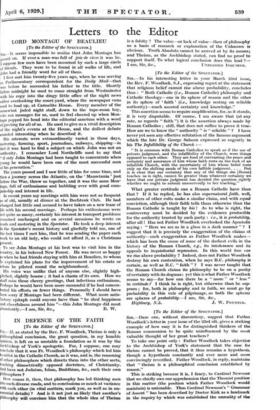IN DEFENCE OF THE FAITH [To the Editor of the
SPECTATOR.] Sur,--If, as stated by the Rev. F. Woodlock, Theism is only a Philosophical conclusion, the great question, in my humble ()pinion, is left on as unstable a foundation as it was by the Archbishop of York's apologetic. For, I suppose, one may mnclude that it was Fr. Woodlock's philosophy which led him to enlist in the Catholic Church, as it was, and is, the reasoning [if other philosophers which directs them into the other sects, eaching diametrically opposed doctrines, of Christianity. had have not Judaism, Islam, Buddhism, &c., each their own Philosophers ?
How comes it, then, that philosophy has led thinking men cto such diverse roads, and to conclusions so much at variance nth each other (in vital matters, mark you, as well as in un- ssential details) ? And is it not just as likely that another's Philosophy will convince him that the whole idea of Theism is a falsity ? The value—or lack of value—then of philosophy as a basis of research or explanation of the Unknown is obvious. Truth Absolute cannot be arrived at by its means; and Theism, as the Archbishop stated, can find no proof to support itself. To what logical conclusion does this lead ?-






































 Previous page
Previous page